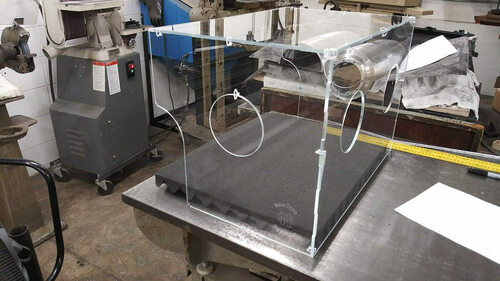
The University of Notre Dame is continuing to respond to demand for protective equipment amid the ongoing coronavirus pandemic, this time with the design and fabrication of intubation boxes for local health care providers.
An intubation box is a clear, open-ended cube that fits over a patient’s head and protects medical personnel during intubation — the process of inserting a tube into a patient’s airway to accommodate the use of a ventilator.
The Department of Aerospace and Mechanical Engineering is fabricating two versions of the boxes — one for Elite Emergency Physicians, a local physicians group, and one for Saint Joseph Health System of Mishawaka — with specialized equipment in Notre Dame’s Hessert Laboratory for Aerospace Research.
Both are based on a prototype developed by Matt Leevy, director of the Innovation Lab at the Notre Dame IDEA Center, in consultation with Dr. Phillip Schafer, a partner with Elite Emergency Physicians, and with assistance from Adrian Rodriguez, a mechanical engineer and a graduate of the ESTEEM graduate program at Notre Dame.
The entire process, from idea to final product, took less than one week.
“We were able, in a week’s time, to evolve four prototypes, then turn that over to the Department of Aerospace and Mechanical Engineering for manufacture on a two-week lead time,” said Leevy, an associate professor of biological sciences at Notre Dame in addition to his role with the Innovation Lab.
Patients are sedated or otherwise unconscious during intubation, and so can’t control whether they cough or gag and expose medical staff to respiratory secretions.
And while respirators and other personal protective equipment block or filter such secretions, none are 100 percent effective.
“Being able to have a solid barrier that provides for 100 percent impermeable air movement through the plastic, but that you can see through and work through, reduces the amount of virus that is transmitted into the entire room air space drastically,” said Schafer, an attending physician and vice chair of the emergency department at Elkhart General Hospital.
Leevy fabricated the prototypes with a small-capacity laser cutter. The Department of Aerospace and Mechanical Engineering is using large-capacity computer numerical machines — milling machines that render objects from computer files — for the finished boxes. Each box is etched with the interlocking “ND” logo and the message “Notre Dame Supports You.”
Elite Emergency Physicians will receive 26 of the boxes, representing a narrower version with shoulder cutouts and two points of access for a nurse assistant; Saint Joseph Health System will receive 20, representing a wider version with one point of access for a nurse assistant. Both are made from locally sourced acrylic.
The project is personal for Robert Chlebek, director of the Hessert Laboratory. Chlebek’s son is a unit assistant at Memorial Hospital in South Bend. His daughter is a former emergency room nurse at the hospital.
“In fabricating these boxes, we’re contributing to a process that helps keep local health care workers safe during this pandemic, and that’s personally very gratifying,” Chlebek said.
Schafer, with Elite Emergency Physicians, said, “Notre Dame has done an incredible amount of work in a very short amount of time, and we just can’t thank them enough. This is the beginning, I think, of an amazing relationship.”
This is just the latest example of the Innovation Lab working with local health care providers to create solutions around the widespread lack of adequate protective equipment during the ongoing pandemic.
In addition to the intubation boxes, the lab is completing orders for more than 5,000 3D-printed face shields, and for more than 10,000 “ear savers” — flexible acrylic adapters that improve the fit and comfort of N95 and other face masks — for local health care providers.
These projects offer a preview of the lab’s role in the new LIFT Network/iNDustry labs, an effort among Notre Dame and other stakeholders to accelerate innovation and economic development in the South Bend-Elkhart region with support from a $42.4 million grant from the Lilly Endowment.
“The Innovation Lab will serve as a prototyping arm of the LIFT Network/iNDustry Labs, with the idea that we will complete viable prototypes that are subsequently passed to other advanced shops on campus for manufacturing,” said Leevy. “That’s our process, rapid prototyping. We joke we make everything from coasters to medical equipment. We take it all, we make it all.”
Contact: Erin Blasko, assistant director of media relations, 574-631-4127, eblasko@nd.edu